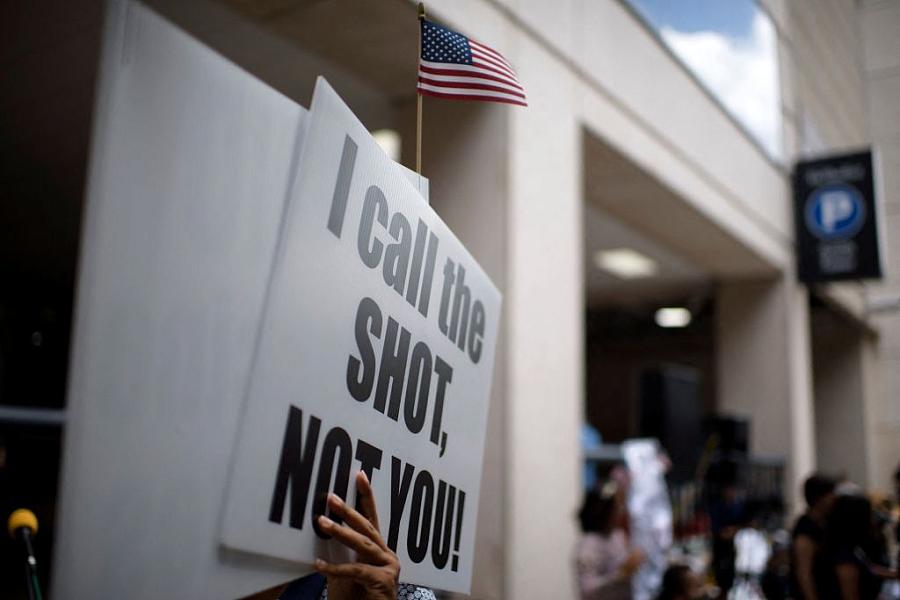Oregon was a hotbed of anti-vaccine sentiment long before COVID-19

(Photo by Mark Felix/AFP via Getty Images)
Back in 2019, Portland was in the midst of a now-quaint problem: dozens of cases of measles appeared in the region.
My search for a new angle on a crisis produced a profile of Dr. Paul Thomas, a prominent anti-vaccine pediatrician in the region.
Fast-forward a year, to spring 2020: Thousands were dying from a novel coronavirus pandemic and the United States had given up on containing COVID-19.
The only choice was to get enough people to have immunity to the new virus through vaccination or infection so that it would no longer spread rapidly. The stakes could not be higher: Fewer vaccinations means more death, generally. But there was a problem with vaccination, one I was familiar with from previous reporting: Portland is home to significant skepticism of vaccines.
In a January 2021 story for Willamette Week, I surveyed the many groups within Portland who might hesitate to get the COVID-19 vaccine, and why — from Republicans and Trump voters who have now become stubborn ideological holdouts, to Portland’s nature-loving moms who have feared the impurities of other vaccines, to Black Portlanders who have a well-earned skepticism of what the medical establishment recommends, to immigrants who are disconnected from medical care.
In some ways it seemed unlikely we would be facing this issue so quickly. In early March 2021, just two states had opened their vaccine eligibility to the broader population. The first four months of the vaccine rollout were about scarcity and a much-hyped alarm that the vaccines weren’t getting into arms within hours but rather days.
Vaccination was a logistical challenge — and one Oregon did not always rise to meet. But our paper covered both the way in which average citizens were left to their own devices in the scramble over scarcity as well as the logistical operation required to get so many doses into arms.
By May, the interest of local officials and the public had shifted from the shortage of vaccines to the longer-term shortage of arms. The story I published in January had laid the groundwork for understanding the trend.
“When you’ve reached that point where you saturated the people who are super motivated to get there and can navigate around the barriers, the change is abrupt,” said Kim Toevs, the local county communicable disease director.
That happened in Oregon, too.
Part of the grounding for my work on vaccination hesitancy and COVID-19 involved getting up to speed on the vaccine research underway. I attended the vaccine fellowship put together by the National Press Club and started interviewing local experts both about the vaccine and the reluctance. Learning the subject matter background early proved helpful.
This project for the USC Annenberg Center for Health Journalism National Fellowship laid the groundwork for the paper’s continued coverage of the issue. In two ways, the paper has pushed elected leaders on accountability for their failures around vaccines.
First, despite repeated lip service to the concept of health equity, Oregon has significant ethnic and racial vaccination disparities.
From the governor down to county officials, leaders discussed an ideal of racial equity with vaccinations, the challenges for which I’d laid out in the original project. But the governor continued to set priorities for vaccines that left Latinx Oregonians behind, as documented in this story. And in Portland, the county health department has fallen short with reaching Black residents, as reported in this August story.
Second, Oregon is unique in the exemptions to employer vaccine mandates that a 1989 state law provides to health care workers (as well as law enforcement).
Sources have credited Willamette Week’s watchdogging of the issue with ensuring that the governor moved to require vaccines for health care workers — in essence, temporarily overruling the law. It’s unclear whether Oregon will repeal its 1989 law, but the governor and other leading officials have said it will be taken up in next year’s legislative session.
The work we’ve done in identifying reluctant groups has also laid the groundwork for a new question: persuasion. The county and the state are offering cash incentives for vaccines and are pushing to reach people in smaller and smaller target groups — including locating vaccine clinics by looking at Census level data. As elsewhere, the story has become about the one-on-one, labor-intensive work required to reach those who may opt for a vaccine.
As for the story that began this endeavor: The Oregon medical board, which is traditionally reluctant to go after doctors, has been pursuing disciplinary action against Dr. Paul Thomas, the pediatrician who we found had advised parents not to vaccinate their children. After Thomas failed to respond to subpoenas, the state went to court this summer to ensure he would turn over records and not have further contact with patients.

